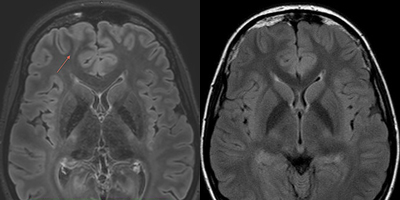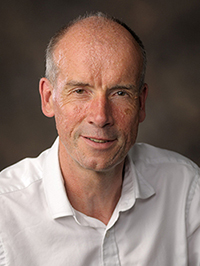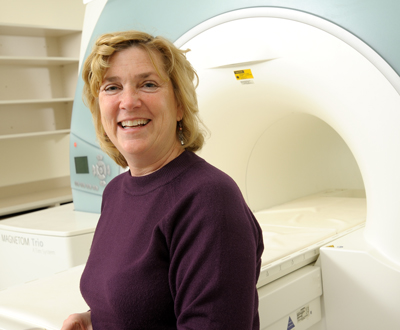Article

Twenty years in the making, a new leading-edge medical imaging research collaboration is becoming a reality.
Carle and University of Illinois leadership recently approved funding to purchase a MAGNETOM Terra 7 Tesla magnetic resonance imaging scanner. They join an elite network of clinical facilities (currently one of only six nationwide) to offer patients access to this technology, the highest magnetic field imaging strength commercially available in the United States approved by the Food and Drug Administration for brain and knee scans of patients greater than 66 lbs.
“Results from the device will help doctors and patients make more informed decisions on treatment choices and determine the effectiveness of the treatment,” said Carle’s Andrew Webb, the director of clinical imaging research. “The active collaboration with Siemens Healthineers is an important factor in the advancement and improvement of patient care.”
 Andrew Webb is the director of clinical imaging research at Carle.
Andrew Webb is the director of clinical imaging research at Carle.
Neurologist and researcher Dr. Graham Huesmann said this type of research collaboration will have lasting impact for people living with epilepsy.
“About one in 10 people will have a seizure during their lifetime, but seizures don’t always manifest in dramatic ways. Even seizures that manifest in small ways — like blinking eyes or pauses in conversation — do damage to precious brain tissue and functions,” Huesmann said.
The 7 Tesla MRI scanner can uncover abnormalities undetected by conventional, lower-strength clinical MRI systems. And its use extends to patients suffering from traumatic brain injury, too.
“With this scanner, we can detect subtle changes to improve the diagnosis and treatment of brain tumors. These subtle differences would be difficult or even impossible to see on other scanners," said Dr. Sinisa Stanic, Carle Cancer Center.
In addition to using the 7 Tesla for clinical scanning, Carle and the University of Illinois will partner to employ its research capabilities. According to Siemens Healthineers, which manufactures the MAGNETOM Terra, the scanner’s dual-mode functionality enables users to switch between the clinical and research tasks, while storing clinical and research images on different databases.

Webb and Tracey Wszalek, the director of the Beckman Institute for Advanced Science and Technology’s Biomedical Imaging Center, will work together to build upon the longstanding partnership between Carle and the Beckman Institute.
“Working together, the two organizations will conduct research at the frontiers of modern neuroscience — discovering new properties of the human brain,” Wszalek said. “Our goal is to partner with the Carle Illinois College of Medicine, Carle Foundation Hospital, and the imaging research community at Illinois to translate technology to benefit human health.”
This research has the potential to better clinical outcomes in the community and beyond.
“Reducing the barriers between traditional scientific and technological disciplines is key,” said Jennifer Eardley, Carle vice president, Research. “These partnerships provide an opportunity for our medical staff to collaborate with researchers in the search for breakthrough discoveries that will improve health care.”
This purchase is a strategic one for the University of Illinois, said Beckman Institute Director Jeff Moore, an Ikenberry Endowed Chair and a professor of chemistry.
“It will foster scholarship, discovery, and innovation, and help translate to incredible societal benefits,” Moore said. “This technology, and the researchers and doctors using it, will change the world in ways we can’t imagine yet.”
The University of Illinois’ Strategic Task Force on health sciences, chaired by Interdisciplinary Health Sciences Institute Director Neal Cohen, highlighted the purchase of the 7 Tesla MRI scanner as a priority for campus. The campus’s current strategic plan, The Next 150, incorporates this plan.
Carle and the Beckman Institute have a longstanding relationship in place already.
Several Carle physicians have clinical affiliate faculty appointments at the Beckman Institute, including neurosurgeons Dr. Paul Arnold and Dr. Wael Mostafa; Dr. Issam Moussa, the medical director, Carle Heart and Vascular Institute; and Dr. Huesmann.
Beckman and Carle fund a postdoctoral fellows program, which allows researchers to conduct interdisciplinary biomedical translational research at both institutions. Since 2008, six researchers have received this fellowship. Together, Carle and the Beckman Institute will better understand the brain’s organization, function, and plasticity, for both healthy people and those impacted by injury and disease. The 7 Tesla MRI scanner will provide a platform for Illinois to lead in the development of ultra-high-field neuroimaging technologies.
Carle’s clinical use of the scanner will initially focus on imaging of the brain and knee, while the Beckman Institute will focus on advancing MRI technologies for neuroscience applications.
“The Beckman Institute's commitment to interdisciplinary research has made it a hotbed of engineering and medical breakthroughs for over 25 years,” Wszalek said. “These advancements would not have been possible without combining technical expertise with clinical insight."
Beckman Institute for Advanced Science and Technology